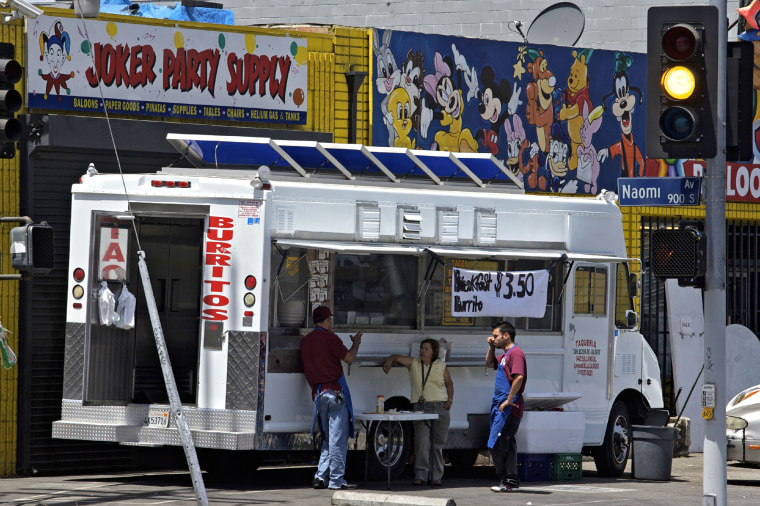A hypothetical wave of entrepreneurial illegal immigrants putting "taco trucks on every corner" would have to come up with serious cash and face stiff competition.
On Thursday night on MSNBC, Latinos for Trump co-founder Marco Gutierrez warned of the impending hordes of Mexican food truck operators should Hillary Clinton win the presidency.
“My culture is a very dominant culture,” he told a flummoxed Joy Ann Reid, guest host on All In With Chris Hayes. "And it’s imposing, and it’s causing problems. If you don’t do something about it, you’re gonna have taco trucks every corner.”
But it will take more than a Clinton win for any would-be taco makers to get into the American food truck business.
While the barriers to entry in the food truck world are low relative to other food-service businesses, a fully equipped truck can cost more than $100,000. Furthermore, there are permits. A truck permit in New York costs $200, while a vending permit can cost $15,000. In dense areas, truck owners also have to contend with a crisscross of parking rules, parking tickets, and scrabbling with rivals for prime spots.
Thomas Yang, the 29-year-old owner of Domo Taco in New York, said his daily food truck costs are about $400, including wages, food, and parking tickets.
His partner bought their first truck second-hand for $40,000 and Yang later upgraded the operation with an $80,000 loan. Suffice to say, an undocumented immigrant would have difficulty accessing the traditional U.S. credit market.
Further, any newcomer on the block would have to carefully navigate the territory. Yang's company has drivers who simply drive the truck to the prime parking spots at 5 a.m. just to be positioned to serve the bulk of their business during the 11 a.m.-2 p.m. lunch crowd. Other food trucks are vying for the same slot and if too many parking spots get taken up then the community can start complaining, Yang explained.
As for a taco truck on every corner?
"I don't think there are enough permits to make that happen," said Yang.
But should those taco trucks populate faster and farther than Starbucks, many on social media joked that they wouldn't mind one bit. Faster than you could dip a chip, Americans took to Twitter to express exhilaration at the very idea of Taco Tuesday all day every day.
One Californian politician even weighed in, posting a map of his district covered with taco emojis.
Fast facts about tacos
4.5 billion
Number of tacos eaten in America every year — enough to stretch along the U.S.-Mexican border 246 times.
1966
The year the first taco truck made an appearance in the U.S.
$857 million
Value of the food truck industry in the U.S.
14,893
Approximate number of people employed.
4,042
Approximate number of food trucks operating today.
"Mexican fare"
Second-most popular item on food truck menus across the country.
$50,000-$200,000
Price range for refurbishing a van into a taco truck.
$500
Average monthly gas bill for truck operators.
$800-$$5,000
Cost of a health permit, required to operate any food truck.
Two
Number of Twitter hashtags launched immediately after Gutierrez's comments: #TacoTrucksOnEveryCorner and #ImWithTacos.

